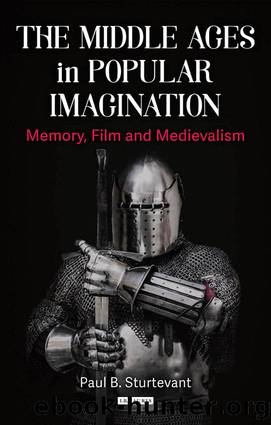The Middle Ages in Popular Imagination by Sturtevant Paul B.;

Author:Sturtevant, Paul B.;
Language: eng
Format: epub
ISBN: 9781786723574
Publisher: Bloomsbury UK
Justin initially (and seemingly instinctually) referred to the costume as being a very medieval element, then referred to the visual aspect of the world generally. However, the conversation then turned to language. To these participants, the language had a certain âgrandioseâ, archaic cadence which fit with their ideas of the Middle Ages. Despite a difficulty in expressing himself, Justin astutely identified a commonly accepted trope that may have little to do with historical reality. But, it is a history effect specific to the Middle Ages â grandiloquent speech signals the Middle Ages, particularly in the mouths of the nobility. It stands as a history effect for pre-modern speech, likely derived from the archaic-sounding (but still recognisable) linguistic patterns of the Early-Modern English of Shakespeare and the King James Bible.
On the other hand, similar to their critiques of Beowulf, John disliked some of the accents used in this film: âA lot of the orcs had this weird sort of Cockney accent, which is not in the right time period obviously because it wouldn't have been around in medieval times. And when I watch it, that actually does bring it down a bit, bring down the realism a bit.â To him, the urban environment of east London that gave rise to the Cockney accent is definitively not medieval, and therefore the orcs' use of it (recalling also the protagonist's use of it in Beowulf) âbrings down the realismâ. This is possibly also a product of the broader (incorrect) perceptions of the Middle Ages as a time without urban spaces, where the participants only saw castles, villages, and fields as appropriately medieval (explored further in Chapter 6).
That said, it is noteworthy that while John was disturbed by an inappropriate accent, he seemed willing to accept the breach of reality represented by the very presence of orcs. This shows that the participants have a multi-layered understanding of historical realism. They seem willing to accept large violations of realism as part of the fantastical world of the film (so long as they fit the general outlines of âmedievalist fantasyâ, i.e. dragons and elves, but not robots or aliens). But even when doing this, they do not surrender their critical perception of historicity. Orcs are fine â so long as they look, act and sound appropriately medieval. The savagery that the orcs represent is, in many ways, a hypermedievalisation of the barbarity, darkness, and monstrosity that have become emblems of the period. As a result, many of the participants understood the film to be medieval and not medieval, historical and not historical, at the same time.
To an historian this may seem odd. The Return of the King is not medieval. Similarly, some participants felt that some aspects of the film were less medieval than others, while some rigidly stated that since the film does not depict our own world, it cannot be considered medieval at all. John labelled anything fantastical or magical not medieval:
Anything which isn't real ⦠anything like the magic stuff, for me, that makes it un-medieval.
Download
This site does not store any files on its server. We only index and link to content provided by other sites. Please contact the content providers to delete copyright contents if any and email us, we'll remove relevant links or contents immediately.
Kathy Andrews Collection by Kathy Andrews(10510)
The remains of the day by Kazuo Ishiguro(7544)
Spare by Prince Harry The Duke of Sussex(4188)
Paper Towns by Green John(4165)
The Body: A Guide for Occupants by Bill Bryson(3791)
Be in a Treehouse by Pete Nelson(3207)
Harry Potter and the Goblet Of Fire by J.K. Rowling(3026)
Goodbye Paradise(2951)
Never by Ken Follett(2873)
Into Thin Air by Jon Krakauer(2695)
The Remains of the Day by Kazuo Ishiguro(2614)
The Genius of Japanese Carpentry by Azby Brown(2602)
The Cellar by Natasha Preston(2592)
Drawing Shortcuts: Developing Quick Drawing Skills Using Today's Technology by Leggitt Jim(2529)
120 Days of Sodom by Marquis de Sade(2428)
Architecture 101 by Nicole Bridge(2348)
The Man Who Died Twice by Richard Osman(2291)
Machine Learning at Scale with H2O by Gregory Keys | David Whiting(2269)
Fairy Tale by Stephen King(2059)
